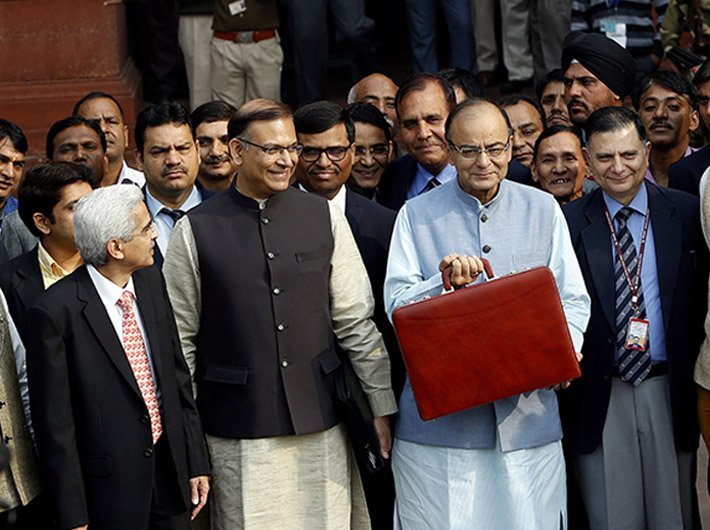Activists say that every life-affirming programme has been subjected to severe budget cuts this year.
A panel of civil society activists campaigning for right to food, education, rural employment, maternity and pension entitlements, has said that the 2016-17 budget does not serve the interest of farmers and the poor, as it subjects “every life-affirming programme to severe budget cuts”.
The activists belong to seven major campaigns including the Right to Food Campaign, Right to Education Forum, Pension Parishad, Alliance for Early Childhood Development, Jan Swasthya Abhiyan, People’s Action for Employment Guarantee And Bhim Yatra of Safai Karmamcharis.
“Even in the case of a much-publicised national crop insurance programme we find that with the National Sample Survey indicating that a whopping 95 % of paddy and wheat farmers and 85% of cotton growers are excluded from all insurance schemes, it is difficult to address this inordinate level of exclusion,” said professor Pravin Kumar Jha of the Jawaharlal Nehru University (JNU).
The activists have unequivocally criticised the undemocratic manner in which the Aadhaar Bill has been presented in the parliament. “Under the guise of a Money Bill, the government is seeking to force down the Aadhaar Bill and thereby they are not only committing an outright constitutional infringement on privacy but also by bypassing Rajya Sabha. They are ignoring the opinions of many states that have concerns about Aadhaar,” said Kavita Srivastava of the Right to Food Campaign.
Nikhil Dey of People’s Action for Employment Guarantee said, “Aadhaar neither prevents leakages of ration – particularly from godown to shops – nor does it deter corruption. On the contrary it gives the officials undue power to decide whose biometrics match or not. It has been proven time and again that it is one of the most inefficient ways of ensuring delivery given the inordinate dependence on machines.”
The experts also believe that if any of the schemes get indexed to inflation it is evident that the decline in budget allocation could be as drastic as over 100% in the case of old age pension. Mathew Cherian of the Pension Parishad said that old age pension amount has been fixed at Rs 200 since 2007-2008. “In real terms it should be around Rs 500 if we take the inflation of all these years into account,” he added.
Exposing the sheer hollowness of the budget, Bezwada Wilson, National Convener of Safai Karamchari Andolan, said that that a five-year outlay of Rs 4,656 crores committed for rehabilitation of manual scavengers in 2013 was reduced to Rs 10 crores in the present budget on the plea that funds are underutilised.
Kavita Srivastava, representing the Right to Food Campaign, said that the budget is far from being pro-farmer. In fact the actual increase in allocation for food security is only 33% and not 128% as being claimed by the government. “Despite the assurance that the National Food Security Act will be implemented across the country by April this year, the budget for the food subsidy has decreased slightly, from Rs 1.39 lakh crore in the revised estimates for 2015-16 to Rs 1.34 lakh crore in the 2016-17 budget,” Srivastava said.
Given the emphasis on direct benefit transfers in the Economic Survey and finance minister Arun Jaitley’s speech, it is not even clear if the PDS in the current form will be allowed to continue for much longer, she said. Food grain and not cash is the demand of the people, she added.
Dipa Sinha of the Right to Food Campaign stated that there is no provision in this budget for universal maternity benefit entitlement of Rs 6,000 to all pregnant and lactating mothers as committed to under NFSA. Despite dedicating a chapter on Mother and Child in the Economic Survey this was not translated into budgetary commitment as the ICD was reduced to Rs 14,000 crore from Rs 15,300 crore in the revised estimate of 2015-16, Sinha said
In the case of MGNREGA, according to Nikhil Dey, the official rhetoric is highly misleading and factually incorrect as the budget allocated neither takes into account what was sought by the states, which is little over Rs 63,000 crore, nor approved by the ministry which totaled up to Rs 47,000 crore. “Therefore it is not surprising that seven out of the eight states that are drought hit have a negative balance and are not in a position to address the acute agrarian distress that farmers are facing” he said.
Vandana Prasad of Jan Swasthya Abhiyan said that given the impact of inflation and population increase the insignificant rise from Rs 19,135.37 crore in 2015-16 to Rs 19,437 crore for 2016-17 actually represents a 6-7% decrease, per capita, in allocation for the National Health Mission. Even the ambitious plan of setting up 3,000 Jan Aushadhi shops is unlikely to succeed due to the paltry allocation of Rs 35 crore, she said.
